
The Raincoats are a British experimental post-punk band. Ana da Silva and Gina Birch formed the group in 1977 while they were students at Hornsey College of Art in London.

Ritchie Blackmore's Rainbow is the debut studio album by American/British rock band Rainbow, released in 1975.

Alec Empire is a German experimental electronic musician who is best known as a founding member of the band Atari Teenage Riot, as well as a solo artist, producer and DJ. He has released many albums, EPs and singles, some under aliases, and remixed over seventy tracks for various artists including Björk. He was also the driving force behind the creation of the digital hardcore genre, and founded the record labels Digital Hardcore Recordings and Eat Your Heart Out Records.

Robert William Gary Moore was a Northern Irish musician. Over the course of his career he played in various groups and performed a range of music including blues, blues rock, hard rock, heavy metal, and jazz fusion.

The (International) Noise Conspiracy was a Swedish rock band formed in Sweden in the late months of 1998. The line-up consists of Dennis Lyxzén (vocals), Inge Johansson (bass), Lars Strömberg (guitar), and Ludwig Dahlberg (drums). The band is known for its punk and garage rock musical influences, and its impassioned left-wing political stance. Up until 2004, guitarist/organist/keyboardist Sara Almgren was also a member of the band. Dennis formed The (I)NC almost immediately after the breakup of his former band, Refused. The (I)nc takes pride in blending the roots of at least four other bands, including Totalt Jävla Mörker (Johansson), Separation (Strömberg), Saidiwas, and Doughnuts (Almgren). In 2007, Inge Johansson also played in the band The Most.

The Monks, referred to by the name monks on record sleeves, were an American garage rock band formed in Gelnhausen, West Germany in 1964. Assembled by five American GIs stationed in the country, the group grew tired of the traditional format of rock, which motivated them to forge a highly experimental style characterized by an emphasis on hypnotic rhythms that minimized the role of melody, augmented by the use of sound manipulation techniques. The band's unconventional blend of shrill vocals, confrontational lyrics, feedback, and guitarist David Day's six-string banjo baffled audiences, but music historians have since identified the Monks as a pioneering force in avant-garde music. The band's lyrics often voiced objection to the Vietnam War and the dehumanized state of society, while prefiguring the harsh and blunt commentary of the punk rock movement of the 1970s and 1980s. The band's appearance was considered as shocking as its music, as they attempted to mimic the look of Catholic monks by wearing black habits with cinctures symbolically tied around their necks, and hair worn in partially shaved tonsures.
Robert John Daisley is a retired Australian musician and songwriter. A bass guitarist, he is perhaps best known for his intermittent relationship with vocalist Ozzy Osbourne, for whom he contributed bass, co-production and songwriting throughout the 1980s. Daisley has also worked with prominent rock acts including Black Sabbath, Rainbow, Gary Moore, Chicken Shack and Uriah Heep, among others. In 2013, he published his autobiography entitled For Facts Sake.
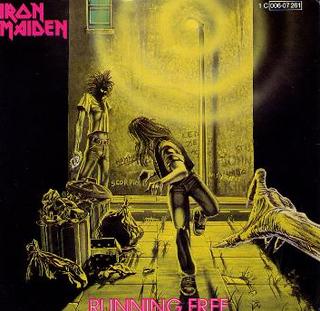
"Running Free" is the debut single by Iron Maiden, released on 8 February 1980 on the 7" 45 rpm vinyl record format. It was written by Steve Harris and Paul Di'Anno. The song appears as the third track on the band's debut album Iron Maiden. In 1985, a live version of the song was released as the first single from Live After Death. In 1990, the original single was reissued on CD and 12" vinyl as part of The First Ten Years box, in which it was combined with the band's next single, "Sanctuary". The 1985 live single was also released as part of this box set, combined with 1985's "Run to the Hills".

Black Monk Time is the only studio album by German-based American rock band The Monks. It was released in March 1966 through Polydor Records and was the only album released during the band's original incarnation. The album's subversive style and lyrical content was radical for its time and today is considered an important landmark in the development of punk rock.
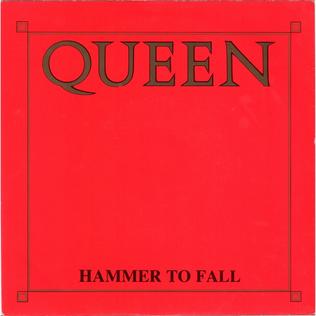
"Hammer to Fall" is a 1984 song by the British rock band Queen. Written by guitarist Brian May, the song is the eighth track on their 1984 album The Works. It was the fourth and final single to be released from that album, although the single version was edited down by thirty seconds from the version on the album. Different sleeves were used to package this single and the live picture sleeve is now a collector's item. The song harks back to the old roots of the band, being built around a hard angular and muscular riff.

Play It Loud is the second studio album by the British rock group Slade. It was released by Polydor on 28 November 1970 but did not enter the charts. The album, produced by Chas Chandler, was the first to be released under the Slade name, as the band's 1969 debut Beginnings was released under the name Ambrose Slade.
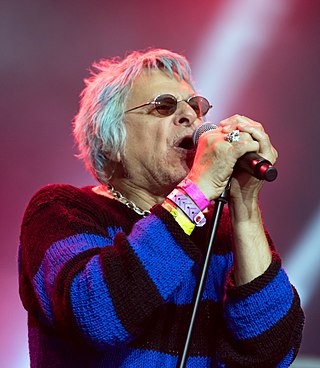
Charlie Harper is a British singer, best known as the lead vocalist of the punk band UK Subs.

Loudest Love is an EP by the American rock band Soundgarden. It was released in October 1990 through A&M Records.

"Stormtrooper in Drag" is the debut single by Paul Gardiner, who was the bass player in Gary Numan's backing band. Numan is featured on the single as a co-composer, producer, musician and vocalist.

Silver Monk Time is a tribute album inspired by the German-American beat band The Monks. It also serves as the soundtrack to Monks: The Transatlantic Feedback, a 2006 documentary film about the band. The record was produced and compiled by the filmmakers, Dietmar Post and Lucia Palacios, and released in October 2006 on the Play Loud! Productions label.
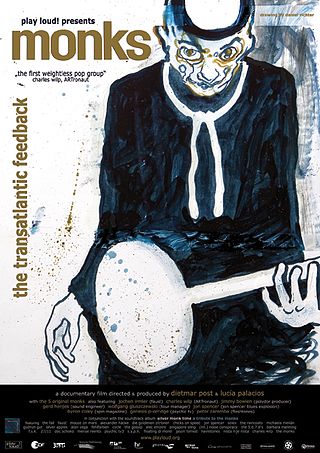
Monks: The Transatlantic Feedback is a 2006 film directed by Dietmar Post and Lucia Palacios about the seminal German-American beat band The Monks. The film was produced by Play Loud! Productions and shot on location in the USA and Germany between 1997 and 2002. In 2008 the filmmakers obtained the German TV Oscar, the Adolf Grimme Award.

"Parisienne Walkways" is a song by guitarist Gary Moore that reached number 8 in the UK Singles Chart in May 1979. The song is featured on Moore's album Back on the Streets and features a vocal from Thin Lizzy frontman, Phil Lynott, who co-wrote the song with Moore. Lynott also played bass guitar on the track, alongside Thin Lizzy drummer Brian Downey, thus reuniting the short-lived 1974 Thin Lizzy line-up which had recorded "Still in Love with You", "Sitamoia" and the single "Little Darling". The melody of "Parisienne Walkways" is based on the jazz standard "Blue Bossa" by Kenny Dorham. It became Gary Moore's signature song.
Gary Burger was an American musician, best known as the guitarist and vocalist for the rock band the Monks.
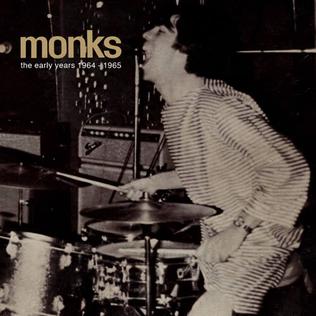
The Early Years 1964–1965 is a compilation album by the German-based American garage rock the Monks, and was released on Light in the Attic Records on April 14, 2009. The album chronicles the group's recordings as the Five Torquays, which was a traditional beat band, up to their demo sessions as the Monks in late 1965. It exemplifies a period in the Monks' musical career in which their rebellious avant-garde style was in its primitive stages. Most of the songs on The Early Years 1964-1965 were featured on the band's only studio album Black Monk Time in 1966. The compilation marks the third time that the demos have been released; however, this latest installment includes much more extensive liner notes and rare photographs.

















